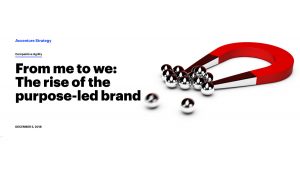
Over half of UK consumers (53 percent) prefer to buy goods and services from companies that stand for a shared purpose that reflects their personal values and beliefs, and are ditching those that don’t, according to new research from Accenture.
The fourteenth annual Accenture Strategy Global Consumer Pulse Research – ‘From Me to We: The Rise of the Purpose-led Brand’ – surveyed more than 2,000 UK consumers to gauge their expectations of brands and companies today. The study found that companies that stand for something bigger than what they sell, communicate their purpose and demonstrate commitment, are more likely to attract consumers and influence purchasing decisions which improves competitiveness.
“UK consumers are investing their time, money and attention in brands that have a genuine commitment to important principles that they care about – such as health and wellbeing, natural ingredients, environmental sustainability and family connections. These principles guide every business decision. Be warned – people can see through inauthenticity and won’t tolerate it,” said Rachel Barton, managing director, Accenture Strategy.
Purpose influencing purchasing decisions
Sixty-four percent of Gen Z and Millennials (aged 18-29) in the UK want companies to take a stand on the social, cultural, environmental and political issues close to their hearts. Furthermore, nearly three-quarters (74 percent) say their purchasing decisions are influenced by the words, values and actions of a company’s leaders. Interestingly, two-thirds (66 percent) of Baby Boomers (aged 55-74) are attracted to companies that reduce plastics, compared to 60 percent of Gen Z and Millennials.
Authenticity and trust driving growth
Today, over half (55 percent) of UK consumers say their purchasing consideration is driven by a company’s ethical values and authenticity. Furthermore, two-thirds crave greater transparency in how companies source their products, ensure safe working conditions and their stance on important issues such as animal testing. Accenture Strategy analysis found that a drop in stakeholder trust can severely impact an organisation’s competitiveness and potential revenues by millions of pounds.
Consumers changing the trajectory of companies
Over half (55 percent) of UK consumers believe their individual protest actions, such as boycotting a company or speaking out on social media, can make a difference in how companies behave. Over a third (37 percent) have stopped doing business with a company as a result of its actions.
“Consumers have the power to bring about success or failure to companies. They are more than buyers – they are active stakeholders and want to feel a sense of shared purpose. These findings should be a powerful wake-up call for all brands to become purpose-led organisations,” Barton said.
Organisations that want to build stronger consumer connections and sustain their competitiveness by becoming purpose-led can do so by:
- Defining what their business stands for: Companies need to determine the larger role they want to play in their customers’ lives and put a stake in the ground. Leaders can do that by understanding what their customers feel passionately about, why their employees choose to work for them and why other businesses partner with them. They’ll find what makes the company special and can use it to make a difference.
- Being clear and authentic: Consumers can see through inauthenticity. If a company is truly committed to its purpose, its principles guide every business decision. This purpose will bind consumers, employees and shareholders alike. It requires bold leadership where actions speak louder than words.
- Engaging consumers on a deeper level: With consumers actively aligning themselves to specific companies and having a stake in their success, businesses can capitalise on this energy by getting customers involved in co-creating new products and services, designing initiatives or partnerships, and investing in the company’s growth in exchange for personalised rewards. Including customers in their innovation ecosystem will help companies maintain their relevance, identify new growth opportunities and markets, and keep them on track with delivering on their promises.
Source: Accenture Strategy

You must be logged in to post a comment Login